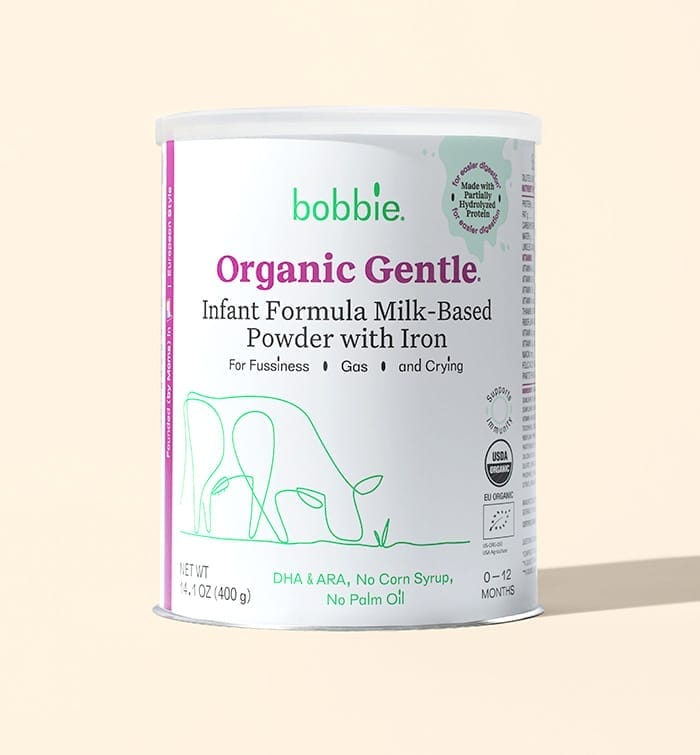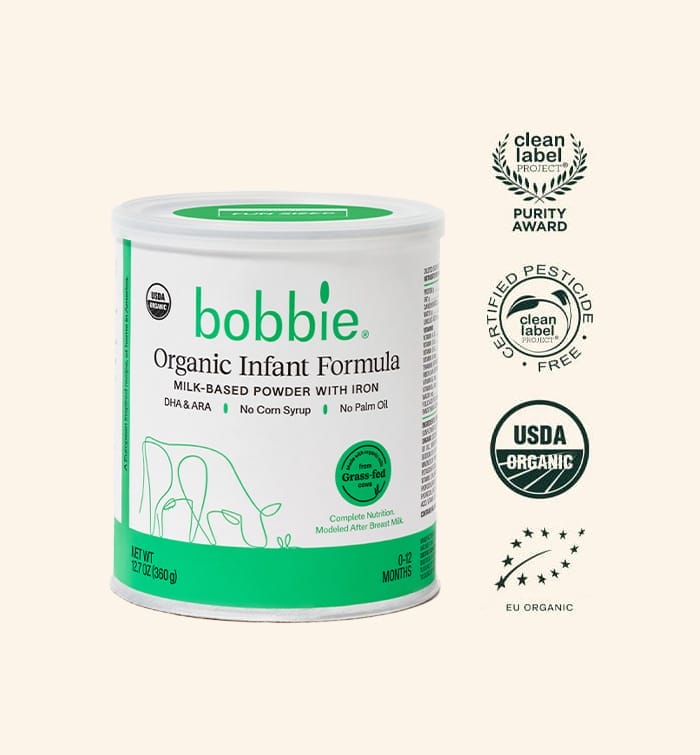We are proud to say that these posts are not sponsored. Our editorial team of Bobbie moms and writers personally select each featured product. If you buy something through our links, we may earn an affiliate commission, at no cost to you.
Picture this: The parents of a six-week old baby who is combination fed (receives breastmilk and formula) have started noticing that in the last two weeks, their baby is squirmy, grunts, and gets flushed in the face right before passing gas. These episodes are occurring more frequently, but last only a few minutes.
They think it could be due to their infant formula, but are they right?
The fact of the matter is, babies are gassy! While most babies tolerate gas perfectly fine, some babies are more sensitive to it. 1
We consulted with Régine Brioché, MD, FAAP, Board certified pediatrician and Bobbie Medical Advisor, to find out what makes babies so gassy in the first place, how you can help them, and when it could be time to talk to your pediatrician about baby’s gassiness.
Listen in on the Milk Drunk podcast with Dr Anthony Porto, Pediatric Gastroenterologist, for more on Gassy Babies: Signs, Symptoms and Strategies.
What is making my baby so gassy?
Remember- all babies have gas (just like all adults!). So it’s important to know that it’s normal for your baby to have gas. However, if they seem uncomfortable, there could be a few reasons why.

Shop Bobbie Organic Gentle Infant Formula
Bobbie Organic Gentle is the only baby formula in the U.S. market that offers 100% partially-hydrolyzed whey protein and 100% lactose as the carbohydrate source. Our gentle baby formula is easy on sensitive tummies to help alleviate fussiness and gas. Learn more about Bobbie Gentle.
Swallowing air during feeding can lead to excess gas
“For bottle fed babies, allowing air in the nipple of the bottle, a milk flow that is too slow and causes the infant to unlatch frequently and cry, or a flow that is too fast and leads to gulping can all cause your baby to ingest more air during their feedings,” says Dr. Brioché.
For breastfed babies, the ingestion of air can be caused by an improper latch.2
Your baby’s healthcare provider and/or lactation consultant can help your baby achieve a better latch, which can help reduce gas.
Their digestive systems are still developing which can cause gas
Just like the rest of their body, a baby’s gut is growing and maturing, so it can’t yet digest food as well as it will when they are older.2
“Their gastrointestinal systems are still very immature,” says Dr. Brioché, “the small intestines of babies fail to completely absorb the carbohydrates in their milk and/or formula. As a result, the unabsorbed material ferments in their bowels causing gas. The longer it sits, the more gas produced and the fussier baby gets.”

Shop Bobbie Organic Infant Formula
Bobbie Organic Infant Formula is a USDA Organic, EU-style infant formula that meets all FDA requirements. It is a complete nutrition milk-based powder modeled after breast milk and is easy on tummies. It is non-GMO and doesn't have corn syrup, palm oil, or maltodextrin. Learn more about Bobbie.
Excessive crying can cause gas
All babies cry (you already knew this!). However, if a baby cries a lot, this means they swallow more air, which can lead to gas.
Some babies cry so much they are diagnosed with colic, which is a term for crying that can last for hours in a baby who doesn’t seem to have anything wrong with them.3
However, it’s important to know that there isn’t any evidence that gas contributes to colic or that treating gas can reduce the symptoms of colic. Babies with colic may pass more gas because they swallow more air from crying, but this doesn’t seem to be the cause of the crying.1
New food introduction can cause gas
Babies younger than 1 year old can’t digest regular cow’s milk well and those less than 4 months old can’t digest baby cereal yet, so it’s important to wait until the recommended ages to give your baby these foods. Juice can also be a cause of gas.4
Besides causing gas, introducing these new foods too early can cause other health problems, so be sure to wait until the recommended age and talk with your baby’s healthcare provider about when to start these.
Tips and tricks to soothe (and prevent) a gassy baby:
It can be hard to pinpoint what’s causing your baby’s gas and discomfort, so the best approach is often to try and address some common causes and see what works. Here’s how.
Ensure proper latching
Bottle and breastfed babies need a proper latch to drink efficiently. If their latch isn’t secure, they can ingest air, which can cause gas. In addition to getting help from a lactation consultant and/or pediatrician, you can also look for bottles that promote less air ingestion.2
Feed at the right angle
Angle matters. Dr. Brioché suggests feeding your baby more upright instead of in a laid back position, like across your arms. It’s important to keep your baby’s head higher than their stomach. This can also help babies who tend to spit up keep more of their feedings in their bellies. Paced bottle feeding is often recommended here.
Take your time with burping
Sometimes, burping your baby is more of an afterthought, especially if your baby has fallen asleep while feeding. If your baby is gassy, Dr. Brioché suggests burping more frequently. During your baby’s feeding, pause a few times to burp them.
Try doing baby bicycles
When your baby has gas, you can try to pump it out of them manually. Lie your baby on their back and gently bicycle their legs. This can help move gas that is trapped, making it easier for them to pass.5
Have more tummy time
Dr. Brioché recommends tummy time 20 minutes after your baby finishes feeding as a great way to eliminate gas and discomfort. Keeping your baby on their tummy can help move trapped air through the intestines so it can be easily passed.
You can also gently massage your baby’s lower back and/or tummy to help move trapped air.
Change bottle nipples
Your baby’s bottle may be to blame for all the excess ingested air. If you think this is the case, try switching your baby to a different flow nipple. If your baby seems to unlatch frequently and cry, they may be ready for a faster flow. However, if they seem to be gulping air, they may need a slower flow nipple instead.4
Gas drops
Many over-the-counter gas drops contain simethicone, which is thought to be safe for babies. Studies suggest they don’t do a great job of reducing gas, but if you are looking to try something new and other methods haven’t worked, chat with your pediatrician as these are likely a safe option to try.5
When should I call the pediatrician about gas?
Is it normal gas or is it something else? If you are concerned about your baby’s gas, you can look for signs that means it’s time to call their healthcare provider.
Dr. Brioché suggests calling your pediatrician if you notice any of the following:
- Blood in your baby’s poop. This can be a sign of a few different issues, one of which is milk protein allergy.
- Multiple episodes of vomiting. If your baby seems like they just can’t keep food down, it could be a sign of a bigger issue.
- Vomiting and diarrhea. Your baby could have a stomach bug that is causing their gas.
- Weight loss, fewer wet diapers. If your baby seems like they are losing weight or making less wet diapers, call their healthcare provider.
- Constipation. In babies, constipation looks like less frequent poop or hard, pellet-shaped poops.
- In older infants taking solids. If you suspect a food intolerance or allergy, speak to your child’s pediatrician.

Shop Bobbie Organic Gentle Infant Formula
Bobbie Organic Gentle is the only baby formula in the U.S. market that offers 100% partially-hydrolyzed whey protein and 100% lactose as the carbohydrate source. Our gentle baby formula is easy on sensitive tummies to help alleviate fussiness and gas. Learn more about Bobbie Gentle.
Final tips on baby gas
Babies get gas, and this is totally normal. And while it’s not realistic to hope you can eliminate your baby’s gas, if you think they are uncomfortable from gas, there are a few tricks you can try to help them out.
Give a try to some of the different methods above and be sure to call their healthcare provider if you notice any of the concerning signs listed or if these methods aren’t working and you need more help.
The good news is that gassiness naturally decreases over time in babies as they grow, mature, move around, and eat differently, so any issues related to gas won’t last forever!

Shop Bobbie Organic Infant Formula
Bobbie Organic Infant Formula is a USDA Organic, EU-style infant formula that meets all FDA requirements. It is a complete nutrition milk-based powder modeled after breast milk and is easy on tummies. It is non-GMO and doesn't have corn syrup, palm oil, or maltodextrin. Learn more about Bobbie.
Sources:
1- Gastrointestinal problems | Stanford Children’s Health
2- Dear pediatrician: What can I do for baby gas relief? | Forbes Health
3- Colic relief tips for parents | American Academy of Pediatrics
4- Abdominal gas and colic | University of Michigan Health
5- Breaking up gas | American Academy of Pediatrics

